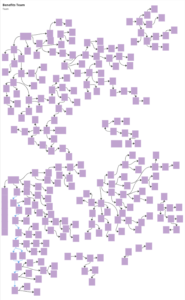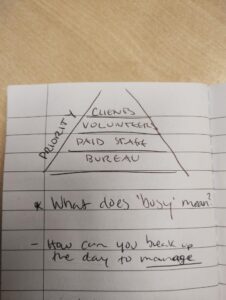Tuesday
I wasn’t there, but at daily catch-up I hear that yesterday was difficult. Inboxes filled more than usual. Endless calls – a record amount of voicemails to work through. I know PerthCAB pride themselves on their callback speed. Quite a few clients dropped-in yesterday in crisis as well. And one that refused to leave, demanding they be prioritised above all the rest. It’s not the first time they’ve had to deal with accusations and aggressions. People are still reeling a bit from it all. There’s asks and offers of support where possible. The team expresses sympathy and lets out frustrations in brief bursts, and then they get right back to it.
In a meeting with our project funders we mention it, the increasing demand. Bureaus across Scotland are experiencing the same thing. We discuss how this may impact the project. The importance of working with bureaus to fit into their capacity. The hope that by creating space for the KTP, we free up space long-term in team member’s schedules. It’s valuable, getting to be embedded at bureau level. I have the opportunity to see this day-to-day and catch those little moments that make up the complexity of service that CABs provide. And it is complex, at every level. From the range of advice given, to the makeup of the bureaus themselves, to the structure of Citizen’s Advice Scotland (CAS) and the various Citizen’s Advice Bureaus (CABs). Our discussions cover client demand, network communication, even keeping the roof from leaking in this weather. I have hope that this project will help begin to introduce preventative ways of addressing issues as opposed to reactive ones. We’re talking about the long term with our funders. What may be happening in the next few years. Its exciting and daunting all at once.

We catch a benefits advisor whose client hasn’t shown for his appointment. He’s got some spare time now and is willing to let me chat with him to learn more about his role. I’m in one of their interview rooms for the first time. Where clients come to receive confidential support. Although PerthCAB are no longer doing daily drop-ins outside of crisis, they continue their in-person appointments as needed. It’s a small space and you can see consideration has gone into its set up. Built for purpose. A neutral territory. I imagine what it might feel like coming into this space, seeking my own support with the bureau. I’ve been shadowing advisors over the last few weeks, taking a semi-structured approach. This allows the advisor to guide the conversation and observation in a way that suits them whilst ensuring that I’m still able to gather the information I need. What does their day to day look like? What processes are they following? What’s working well? What isn’t? What would they like to see in the future? This time the chat flows quite naturally, I almost don’t need to ask him any questions. He’s got a lot to share and that works well for me. We go through his role and bit by bit it pieces together for me. The remit he covers. The flow of his work. His attitude towards the job. The challenges he faces and the challenges his clients face. His expertise and knowledge seem second nature. He’s aware of his place in supporting others and mindful of not getting too phased by factors outwith his control.
I meet with the business development team. We’re going through our tasks, reviewing what’s been done and what we have yet to get to. We quickly discover our project management software has introduced a new winter feature – wee animations play as you tick a task off your to-do list. We get momentarily sidetracked trying to get the animation with a winter fox that someone saw earlier. We go through our various boards – partners and stakeholder relations, external meetings and events, project monitoring and management. It’s a good way to stay up to speed on where everyone is. I update them on some of my own tasks and we’re able to define some next steps for the KTP.
Wednesday
It’s cold today and very busy. Wednesday’s catch-ups are about wellbeing. Recent weeks have been a chance to talk about getting into the holiday spirit, managing the winter darkness, or a very detailed chat about slippers – their design, how they reflect on someone’s personality, and, crucially, whether or not you should be washing them. Today we’re taking a chance to moan. I can already tell how necessary it is in this kind of work. To be able to get things off your chest when appropriate and possible. We keep things fairly lighthearted today. Why are people walking along the dark country roads dressed in all black?
I’m off to help brainstorm some workshop ideas. They’re exploring referrals and a new system that could allow clients to get more holistic support between different partner organisations in the third and public sectors. They’re hoping to engage with people early next year to more clearly determine what this could look like. We discuss what stage they’re at and I get an overview of what the system may look like. I try to break ideas down into more detailed goals. What exactly are you looking to get out of this workshop? What questions need answered? We explore what methods might be most effective at gathering insight. I try to encourage incorporating as much as activity as possible. Get participants out of the discussion space, out of their chairs, out of the normal way of working. Have them thinking laterally and working collaboratively. I love this kind of work – dissecting our thoughts into more defined objectives and bouncing ideas of one another to conceptualise the most engaging and insightful approach.

I get back online to meet with a Help to Claim advisor. She talks me through her process. The way she sets up for the day. The steps she has to take. The areas she makes sure to check. A large area of her work involves migrating clients from legacy benefits to Universal Credit. They always make sure to prioritise the clients, ensuring that they stick with the benefits that will help them the most. She worries that those with language barriers aren’t always getting in touch. Clients aren’t always aware that translators can be added into the call and she doesn’t want that to be a obstacle to them accessing support. Her structure differs to some of her team members, as the Help to Claim service works on a national level. They’ve managed to maintain a good support network despite the remote working across the bureaus. There’s multiple internal chats, ones for sharing knowledge and ones to bond, regular meetings, and frequent training. She feels connected and supported by her team.
After lunch I’m into another meeting. It’s to discuss the referral system we’d considered earlier, this time with people from the local authority and those running the system itself. Although everyone’s coming at this from slightly different requirements and restrictions, they’re all in the room with the same goal – to join up organisations through external referrals so that members of the public have better, holistic support. The system seems to be adaptable and hopefully they can find ways to tailor it to the needs within Perth and Kinross. It’ll then become a matter of determining what those needs are. Challenging within the varying structures and processes of organisations throughout the area.
It’s nearing the end of the day and we’re discussing an obstacle the bureau is facing that they’re hoping can become the focus of the mini project we’ll be tackling within the KTP, gathering client feedback. The methods they’ve been using to collect insights from the clients thus far haven’t suited their goals and they’re interested in finding an effective method to determine whether or not they’re meeting public need. It’s difficult to find an approach that can capture a rich and honest picture of people’s experiences whilst not demanding too much of a person’s time and demotivating them to participate. They’re not the only bureau facing this challenge either. Different CABs may have different questions they’re hoping to answer and ways that they’re engaging with clients. It’s a complex challenge to tackle.
Thursday
Today I’m with the core team at PerthCAB. After daily catch-up we sit down together with cups of tea as they explain their work to me. There’s a lot covered in their remit – Frontline calls and emails, generalist advice, internal and external referrals, coordinating and supporting volunteers, crisis assessment, case designation, training and client triage. As they say, they’re there to fill in the gaps. They’re required to be flexible, always. No two days look the same. The landscape is ever changing, with endless cases coming in and no way of knowing what the area of support will be required in advance. Not to mention balancing that with different staff and volunteer schedules and capacity. Their role requires endless judgement calls. Weighing up client need with staff and volunteer capacity. Continually re-prioritising, often under the pressure of time and distress.

It’s hard to define how it all works. The balance of tasks seems insurmountable in some ways and yet they’re usually clearing their inbox and responding to calls and voicemail on the same day they came in. I compare it to something of an ‘X-factor’ – that indescribable quality that underpins their ability to balance and deliver their core service. It’s not something they’re quite able to articulate either. It takes time and experience, 1-2 years to really get there. It can’t really be understood without doing the process. We decide it’s time for me to start observing.
We start with a voicemail. Check to see if they’re an existing client or new to the bureau. Did they give us permission to call? To leave a voicemail? Without explicit permission they can’t, to ensure client safety. We call them back, explain who we are, ask how we can help. It could be anything on the frontline – debt, relationship advice, housing, energy issues, immigration, benefits and more. They have to ready to respond no matter the topic. If it’s generalist advice, that lies with their team, otherwise it’ll be a referral onto a specialist advisor. Either way, they’ll need to gather information. Start a new case file if needed. There’s not time to log it extensively whilst mid-call. So they jot down notes while they speak. While they look up references to ensure they’re providing the accurate advice. While they check local organisations to confirm opening hours. While the office is filled with the hubbub of other calls, clients, and conversations. It’s an intricate, fast paced dance and I’m struggling to keep up even as an observer.
At the end of the call, it’s time to record everything on CASTLE, Citizen’s Advice’s case management system. Everything is meticulously logged. All advice offered, even if the client choses not to go with it. All sources evidencing where the advice came from. Even attempts to contact, where the client didn’t pick up the phone are accounted. This attention to detail is imperative to the delivery of CAS’s service. It ensures that any advisor can be in contact with a client and quickly and easily understand the context and history of a case. Clients can have a more seamless experience and won’t be required to repeat their story each time they get support. It’s also an opportunity for CAS to gather anonymous data to help inform social policy and advocate for change.
Between returning calls, there’s emails to reply to, volunteers to support, referrals to address, and the occasional client in crisis dropping by the office. There’s always someone offering a cup of tea or a biscuit. People take little moments to breathe and talk. It’s quite a sight to witness, the frontline work. There’s a clear level of trust and camaraderie amongst the PerthCAB team members. It allows them to work to one another’s strengths and support one another well. The morale improves at the bureau and in turn, the services they provide do as well. These last few days have only been a small capture of the bureau, but getting to shadow PerthCAB for a week has been invaluable for building up my understanding of the ways of working and dynamic of the team.


